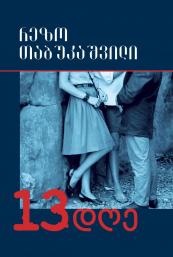13 DAYS
TABUKASHVILI REZO
Rezo Tabukashvili tells us about a generation which was 18-19 years old in the 1990s and now is somewhere in its forties. The narrative moves about over this interval of twenty or twenty-five years. The novel begins with Tina, suffering from depression, going to see Sandro the psychotherapist, but she prefers to inform the doctor by letter about the events which caused her a deep trauma. Sandro agrees to have this sort of relationship with his patient and so the text’s main feature is its epistolary form, in which the story of Tina’s and Gege’s love is told. As Tina herself says, this is an ‘old’ story, but they are not children or innocents and the circumstances in which their relationship developed are more up-to-date than ‘old-time’. For example, Gege is involved in architectural tenders, while Tina opens a Facebook account with the aim of relieving Gege, who is ‘in the process of rehabilitation and reform’, even though he dislikes Facebook intensely and tells her to get him out of this ‘poisonous military base’. On the other hand, Lika, with whom Tina is now friends, followed by Gege, was detained for seven years during the Abkhaz war. While Lika is a prisoner, Tina gets to know her then, when she is already living with Gege, it turns out that Tina and Gege’s relationship began in the 1990s and really is ‘old’. But while reading the book, you won’t notice the discrepancy. The author is very cunning in the way he moves his characters between the 1990s and modern times, changing ages and circumstances so as to keep the realism on track and, in an imperceptible way, confuses the spaces where the action takes place and finally makes them mutate.
The doctor Sandro, however, reading Tina’s narrative, makes for a second thread. He is brought a woman who needs treatment for alcoholism: he recognizes her as Verochka, his first love. As thirteen-year-old adolescents, their first feelings were aroused. The village of Old Likani, where they got to know one another, has been replaced by New Likani, and here two periods intersect, the old irrupts on the new…
These two parallel lines finally meet and create space for a detective story, although, in the end, we get a pseudo-detective story, because the laws of the genre are here overridden and nothing fits logical analysis. It breaks even Chekhov’s rule, that if a firearm (which is presented to Sandro) is visible to everybody, it must be fired. Quite the contrary: the lad whom Gege stares at very aggressively in Vake park does not kill Gege. Buñuel was very fond of putting such dead-end symbols into his films. People who have no influence at all, as one might normally understand it, on the plot’s main lines, quite frequently appear, and then instantly vanish in the main heroes’ sphere of action: there are Kicha the fisherman, Gege’s father, a drug addict in Aramiants hospital, and others. Either the author sees no need to involve them in the detective-story plot, but just makes them a singularity in the fatality of the main fates: they are not what actually impacts on anybody.
Extract will be available soon
In case of using the information, please, indicate the source.
‘As Rezo himself writes, the novel’s heroes are ‘shattered souls’ with ‘wrecked relationships’. The women’s features are very interesting. The women, Tina and Lika, take us into unknown territory. Verochka, too, is a particular story-line, and a very interesting one. As you read, you feel that tragedy is inevitable, given such relationships.’
Gaga Nakhutsrishvili, poet
‘Rezo Tabukashvili’s 13 Days is a memorable book, written about a generation and an epoch, with heroes who have been modelled on life and yet, at the same time are symbolic figures and complement one another.’
Shota Iatashvili, writer, critic
Extract will be available soon
In case of using the information, please, indicate the source.
